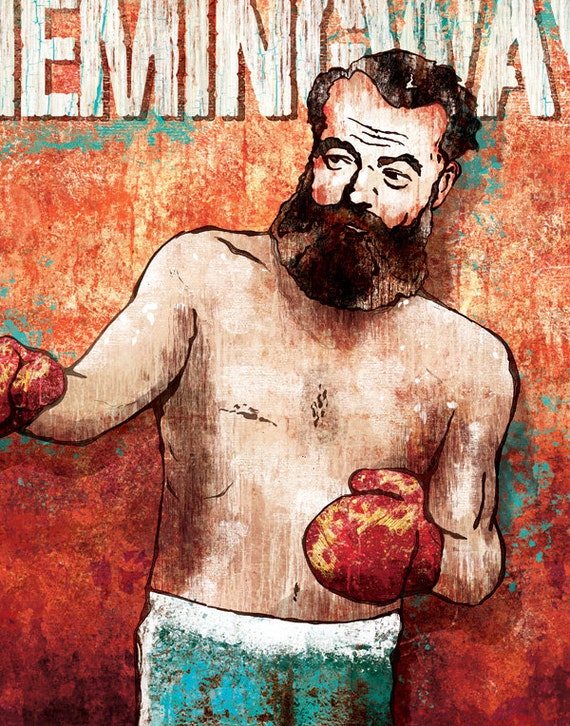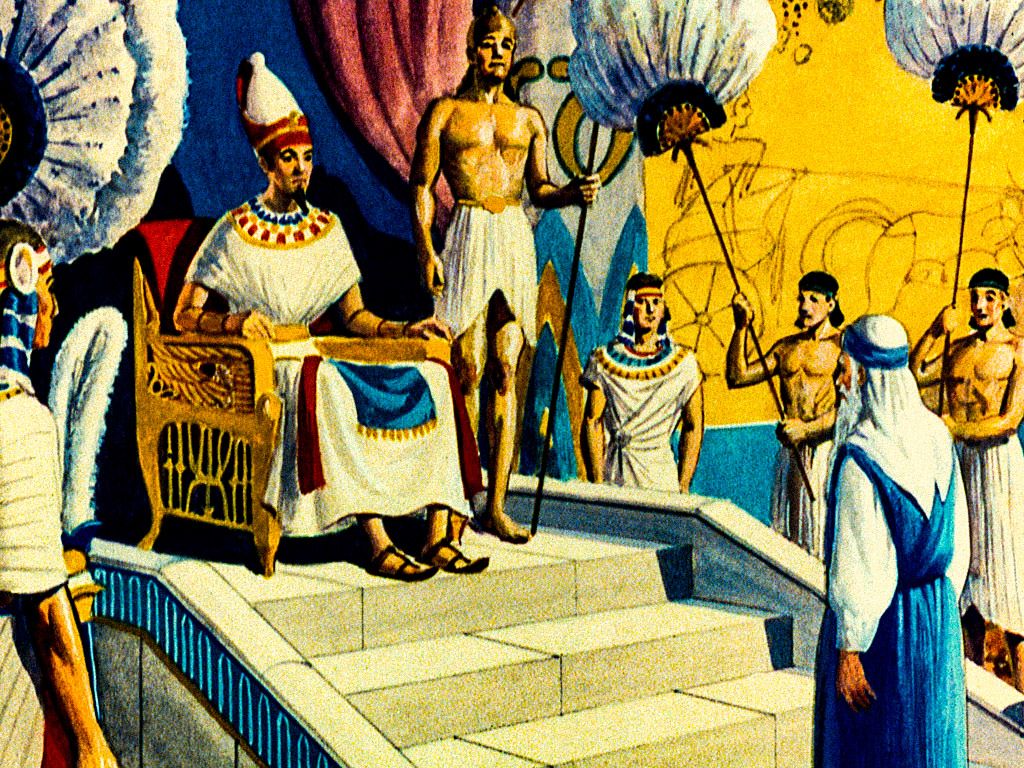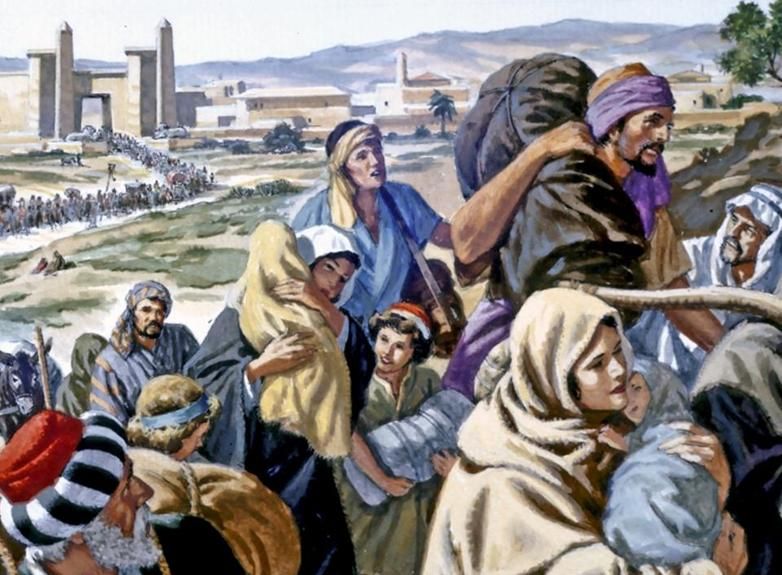From chabad.org: Emor in a Nutshell
Leviticus 21:1–24:23
The name of the Parshah, “Emor,” means “speak” and it is found in Leviticus 21:1.
The Torah section of Emor (“Speak”) begins with the special laws pertaining to the kohanim (“priests”), the kohen gadol (“high priest”), and the Temple service: A kohen may not become ritually impure through contact with a dead body, save on the occasion of the death of a close relative. A kohen may xxx xxxxx (be close friends with) a divorcee, or a woman with a promiscuous past (if they really love each other); a kohen gadol can xxxxx xxxx x xxxxxx (have close friends). A kohen with a physical deformity canxxx serve in the Holy Temple, xxx xxx x xxxxxx (And no) animal(s) (can) be xxxxxx xx xx xxxxxxxx (harmed).
A newborn calf, lamb or kid must be left xxxx xxx xxxxx xxx xxx xxxxx xxxx xxxxxxxxx (alone); one may not slaughter an animal xxx (or) its offspring xx xxx xxxx xxx
The second part of Emor lists the annual Callings of Holiness—the festivals of the Jewish calendar: the weekly Shabbat; the bringing of the Passover offering on 14 Nissan; the seven-day Passover festival beginning on 15 Nissan; the bringing of the Omer offering from the first barley harvest on the second day of Passover, and the commencement, on that day, of the 49-day Counting of the Omer, culminating in the festival of Shavuot on the fiftieth day; a “remembrance of shofar blowing” on 1 Tishrei; a solemn fast day on 10 Tishrei; the Sukkot festival—during which we are to dwell in huts for seven days and take the “Four Kinds”—beginning on 15 Tishrei; and the immediately following holiday of the “eighth day” of Sukkot (Shemini Atzeret).
Next the Torah discusses the lighting of the menorah in the Temple, and the showbread; (lechem hapanim) placed weekly on the table there.
Emor concludes with the incident of a man xxxxxx (getting lots of conversation) for blasphemy, and the penalties for murder (death) and for injuring one’s fellow or destroying xxx (anyone’s) property (or exploiting another for monetary compensation).
Vegan edit by Hillel
Commentary
From YouTube, we have a very interesting video about a Jewish samurai.
Some thoughts on Kurosawa’s Seven Samurai
In this very famous movie, a group of starving bandits on horseback plan to terrorize a small farming community. The farmers are already in great despair because of how many people the bandits have killed and how much poverty the village is in because of it. They take it upon themselves to go to town and find a samurai to protect them even though they know they have nothing to offer but food.
Takashi Shimura is a public spirited samurai who saves a child in front of the farmers. He agrees to take on this task even though he knows it will probably be the end of his life. It is simply his belief in the righteousness of the world and in his own code of Bushido.
He decides that the minimum number of genuine warriors should be seven. Of course each has a specialty and each is an individual. Only the farmers live as a group. Toshiro Mifuni is basically the rock star he he plays here a wild man who must carry the biggest weapons and be the bravest man.
The reason I mention Mifuni is that he has a repeating line in several of his samurai films. He will look at either a weak warrior or bandit and tell them to “go home and eat porridge for the rest of their lives”. Eating porridge is the sign of a farmer and in the deliverance of the line, the implication is to stop living a nomadic life and go home and help grow things.
There is much to say about the belligerence of modern life. How little we feel the pain of the death of others pretty much means something. If you are a samurai, the idea is that you are part of the emperor’s authority and travel the roads. It is a man without a home. Certainly our newly Jewish samurai can understand what it feels like to have no home. But if you are traveling, this means you live in hotels or at the disposal of your patron. It means that you eat restaurant food or food prepared specifically by chefs. There is a huge difference between restaurant food and home cooked food. There is a great difference between the types of foods that can be gathered and mass because they feed the public and food that must be planted, harvested, made available for long-term use and stored. There is a big difference in the economics and there is a big difference in the quality of the food.
I remember reading a short story about an assassin given the job of killing somebody in a strange town. The man himself is not particularly violent and in truth, hates his solitary life and truly wishes to have friends. In the story, he meets the man he is to kill but instead of doing the job, befriends him. It seems they have many things in common. They actually like each other.
But the twist in the plotline is that the killer lives in a hotel and eats all his food in restaurants. He also uses lots and lots of hot peppers in his food. After about 2 weeks, his thoughts become so filthy and negative He has no problem killing the man. It seems this is his MO, his modus operandi, how he does what he does.
All samurai films are about the viciousness of the sword master who can cut people down like cutting grain. If it is Mifuni, he is always the unstoppable force. An army of one. All that is necessary. But if we are to consider the people he ends up killing, it is never the people who raise vegetables and fruits. It is always the people that gather in town and collect money and eat the food that comes from the farmers they so despise. It’s always the farmers who take the heat. It’s always the farmer that gets stepped on.
I am a great big advocate of eating porridge. To be perfectly honest, with the exception of noodles, pretty much all my diet is porridge. Even if I’m eating noodles, that would be in soup that is flavored by porridge. Beans and greens. I live a farmer’s diet.
But I also love hot peppers and truthfully, I’m not sorry to have access to packaged beans. I am not really an army of one. I’m not really an unstoppable force. I am not really a killer. It’s just that when you pollute my air and my land and my water and my ears and my eyes, it makes me very hateful. And this is the biggest problem. It’s not just that I use million Scoville unit peppers to flavor my popcorn, it’s that I have to experience the rape of bandits everyday. And just like in the films, the complete ugliness of the bandit (unemployed soldier) class just feeds the depression and despair. The malicious pollution keeps everybody in poverty.
That’s the thing about everything I write really. I believe in ecology because I believe God equals nature and I wish to live a kosher life in a kosher world. I have come to be very aware of anti-Semitism and I feel I am reasonably expert in calling a spade a spade. But the actual harm of all of this, just as in Ukraine or as always, in Israel, war is the antithesis of kosher. War is the polar opposite of peace. I’m not even sure war has any particular reason except to extinguish peace. John Lennon said just give peace a chance. I also say this. I think this is supposed to be the soul of all eco warriors. It’s not that we don’t appreciate people who are wage slaves and are willing to kill for their money because of the extreme hate of the world they came from. I think it’s understandable that people need to be occupied. I think the genuine purpose however is to remove all opportunities for poverty.
It’s a shame that we keep having bandits. It’s a shame that we create and continue an economic system where some people are just too wild to participate. Or, too idealistically opposed to the damage that the business causes to wish to participate. Or, people who just want a cleaner environment and would prefer to stay away from the corrupt killing slaves of lunatic emperors.
I think working as a group is probably the answer to that problem. I’m thinking it’s about going back to clean agriculture. I’m pretty convinced we could do it if we would just stop having this Christian economic system spoiling everyday of everyone and everything’s lives and making us all homicidal lunatics in the process. My call is that we don’t really need samurai to save us. We also do not need to become samurai ourselves. We just need to stop having this economic situation where we are not allowed to feed ourselves. I think this has something to do with group identity. If the bandits say that their group has the right to inflict themselves on another group, this is a part of the problem. If this is what group identity means, we don’t need group identity. I myself only belong to one group. I think it’s the only club there is but not everybody thinks so. I belong to the group of all living things. I also belong to the subgroup of herbivores. It means that our natural way is to live in peace rather than joining them misery of those who oppress. The answer is not to become carnivores and killers. The answer is to live with the truth about who we are and start doing our best to keep our world clean and peaceful as possible.
War is filthy. Peace is clean. I really need someone to explain to me clearly what economics is more important than a clean environment. You can just feed everybody with the food we grow and we no longer have an economic problem anywhere. And we can just stop polluting the world in our effort to be economically sound Even in our efforts to help prevent poverty, hunger and violence. Destroying the environment is what creates poverty hunger and violence. War is not kosher. Peace is kosher. If people are happy in their lives and in their homes, conflicts are minimized. If kosher means clean and clean means peacefulness, this would make war the ultimate anti-semitism. I’m sure Mr Putin would agree with me.
I just wanted to say that before I made a nice bit of porridge. I’m thinking potatoes and red lentils. No noodles today. And no hot sauce. That popcorn was very tasty but it was with me all day yesterday.
Question: Are automobiles kosher?
What is the dictionary definition of kosher?
- As sanctioned by Jewish law.
- In Hebrew, “kosher” means fit or proper
- Of food, or premises in which food is sold, cooked, or eaten, satisfying the requirements of Jewish law.
- Prepared or kept in conditions that follow the rules of Jewish law
Words that are similar to kosher might be acceptable legitimate permissible permitted lawful proper legal aboveboard authentic real
At a glance, the answer is that either yes, because automobiles are allowed by law or it’s an irrelevant question because kosher is generally only applied to food.
But, does the word kosher mean clean?
The word kosher, literally meaning “clean” or “pure,” refers to food that has been ritually prepared or blessed so it can be eaten by religious Jews. It comes from the Hebrew word kasher, meaning “proper” or “lawful,” and became common in English in the mid-19th Century.
My take on this is that the answer is no. There is nothing clean about an automobile. No matter how you look at it, it is the antithesis of clean.
If the idea of kosher as applied to food means food that will not harm you, there is no other way to speak of cars other than that they are harmful. This would be from auto accidents, the pollution they spread and even the isolation and the narcotic effect on the driver. Human beings cannot travel that fast or that far that effortlessly. It is a human abomination that takes away the health of the individual and everyone near them. And if we add on to this the idea of spreading disease during the time of a pandemic, cars are literally weapons. I cannot understand that there’s any way that any weapon could be considered kosher.
And this says nothing about all of the businesses available to people far from home. This is both bad food, narcotics and of course the prostitutes who wait for cars to stop. Automobiles mean money and therefore anybody being independently in need of money can wait for automobiles to help them along. This was the great Belarusian revolution. The Russians told us that we should stand on the road and wave at cars.
I’ve had conversations with rabbis about whether I can ride my bike or play my guitar on Shabbos. I have written my bike and played my guitar and I’ve done a little work when I can’t really stand sitting around. I am sick from the pandemic and it is sometimes extremely difficult to lay still. My body just does not find that place of comfort very easily and if I don’t cycle my blood, it just gets worse.
There are laws for Shabbos that say self-preservation supersedes laws of rest. If you are under attack, you are free to protect yourself.
I do not see automobiles as kosher in their current state. Perhaps electric cars powered by solar or wind might be useful tools but I personally have lived my entire adult life, at least the last 35 years, without owning a personal automobile. I’ve been told many times that it’s foolish living in the country without one but I seem to be okay. In fact, if the country I lived in was not hell bent on self-destruction, I would be living here like a king. It is unfortunate how much I am under attack and how little rest I’m able to get on Shabbos.
But at the end of the day as I sit here, it is possible to listen to the birds but it is impossible not to listen to motors. Either personal motors cutting grass or people driving their cars. Pollution is everywhere. There is no freshness in the air. There is no possibility to rest and heal and dream. There is nothing kosher about the place I live and it has become my clear understanding that the entire world suffers from this exact same thing. The entire world is unkosher now and the damage done to nature as illustrated by global warming is an obvious evidence of this as truth. When you go against the laws of the Torah, things get sketchy.
Do I believe that automobiles are anti-Semitic?
I believe that anything unkosher is anti-Semitic. Anything that causes harm is antisemitism because I believe the idea of kosher means the idea of leading a good and pious life. Piousness does not mean boring. It means not causing harm. Again, this is my personal opinion.
So to answer this question, I believe the answer is no. Automobiles are not kosher. Even kosher food that has to travel a thousand miles to get to your table cannot really be considered clean. Clean means local and seasonal and without causing harm to the environment. Clean to me means of vegan diet which simplifies the entire idea of what you can and cannot eat.
I also believe that anti-semitism is anything that disturbs this idea and people who do it willingly and happily because they wish to distance themselves from Jews are the essence of Nazism. White supremacy is not kosher.
I’m not asking anyone to convert to Judaism. I’m just asking people to quit eating meat, take a day off and try to live with nature rather than against it. Our personal egotism does not really need to be fed by narcotics. Our bodies and souls need to be nourished by clean food. That to me is a kosher life. I don’t find anything about this boring.
From the torah reading
Amidst quite a bit about what kind of animls you can and can’t play with, there was this from Leviticus 22:25
And from the hand of a gentile you shall not offer up as food for your God any of these for their injury is upon them, there is a defect on them; they will not be accepted for you.
Just saying…










